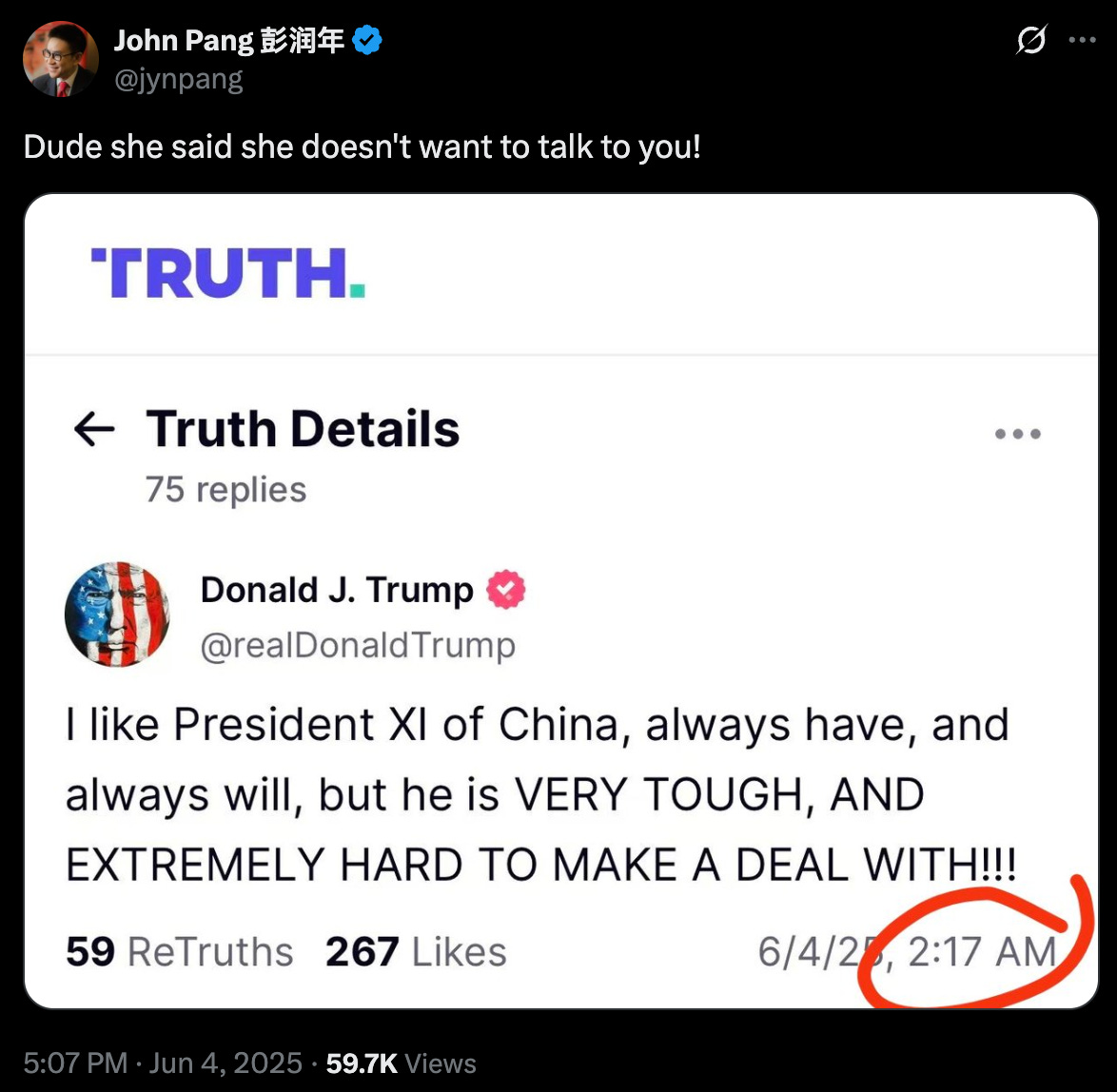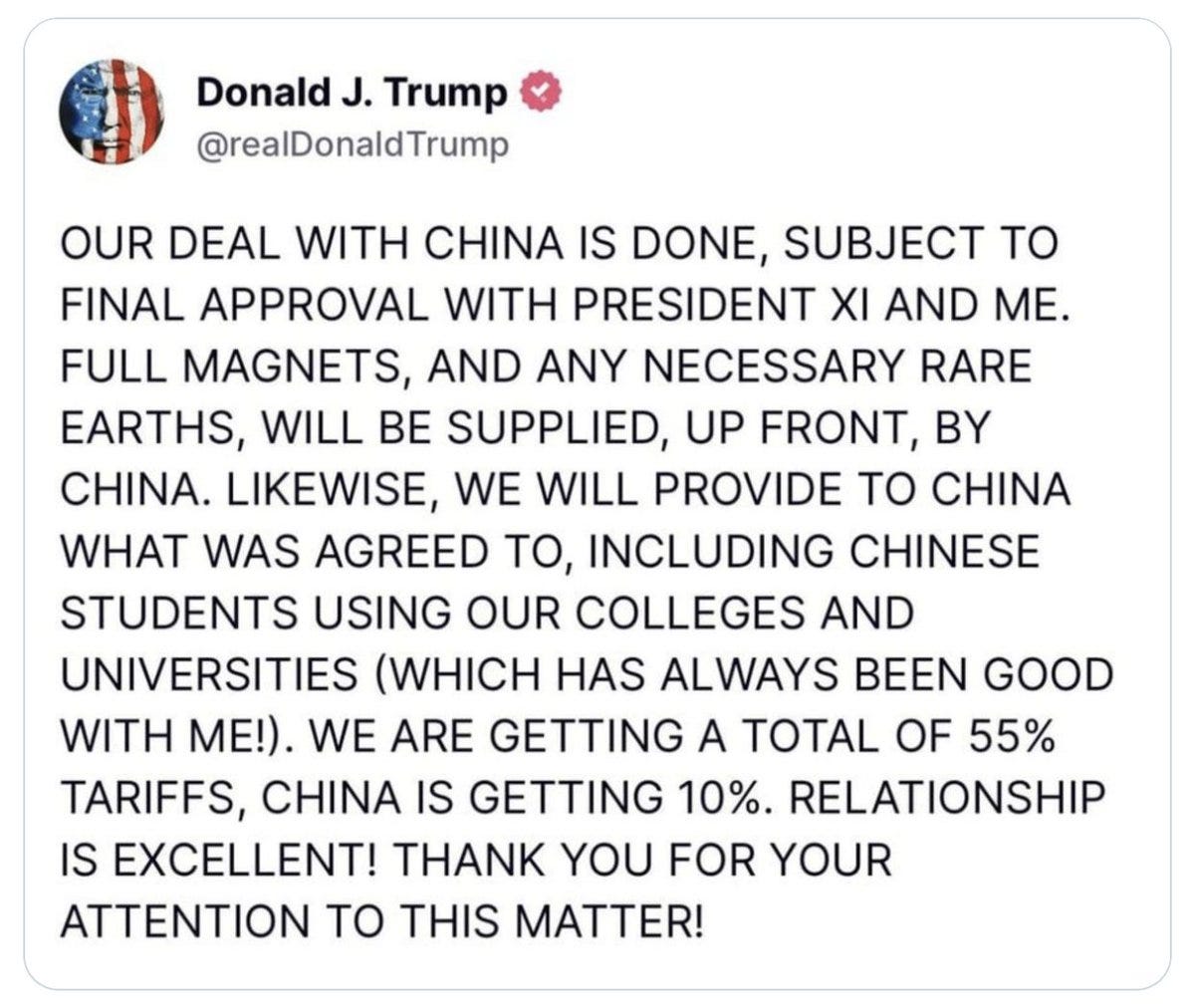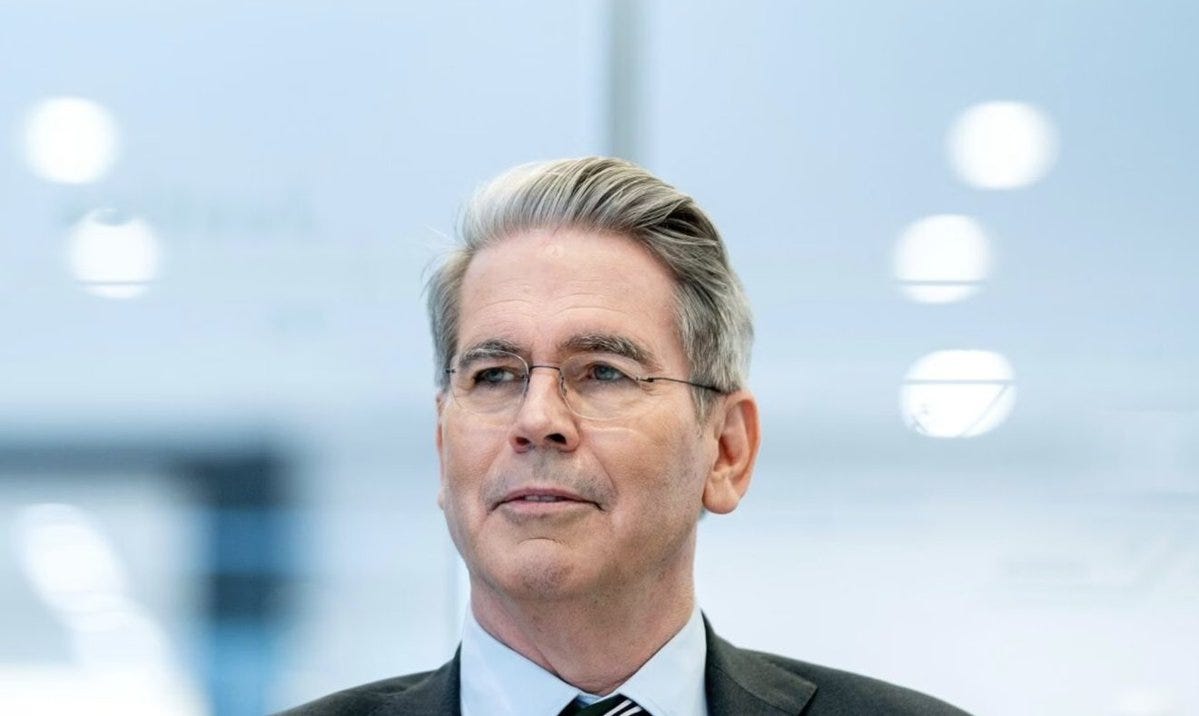Showdown in Londontown
What just happened with US-China trade talks in London? Win? Lose? Draw? Or a secret fourth thing?

The choice of London for the latest round of US/China trade negotiations is surely inspired. The UK is one of the few places that actually came to some sort of agreement with the US after Trump’s 4/2 Liberation Day bombshell. And frankly most countries are waiting on the sidelines to see how the dust settles between the two big dawgs — US and China — before jumping into a deal.
To very lightly recap, there has been a lot of twists and turns. After raising mutual tariffs to comedy level numbers, the two sides met in Geneva and basically rolled the nonsense tariffs back all the way to “just” 55% for the US and 10% for China. I’m looking for those tariff numbers from Geneva to stay pretty frozen for the time being. London was more about the non-tariff measures…with China’s Rare Earth Elements (REE) export control the biggest bone of contention on the table.
Recall that China quietly slipped in REE export controls as a non-tariff trade measure and none of us really paid much attention during the high-drama of Liberation Day and it’s aftermath. However, in the month or so siince then, the penny has dropped: the REE is a hugely strategic card and a real potential chokepoint for multiple American industries. The more I find out about this the more amazed I am. This was a known problem! Nobody thought to stockpile some of this stuff?
Anyhow…at one point Trump was so desperate for a call with Xi I was seeing “Call me Maybe” jokes all over Twitter. It really looks like the Chinese have the Americans over a barrel with this rare earth stuff. I learned SO much about inorganic chemistry my High School Chemistry teacher would smile if he only knew. Last week if you asked me what Samarium is I probably would have said “you mean the folks who wrote the Epic of Gilgamesh?” Now I’m can hold forth. “Ah…Samarium…still techinical a light Rare Earth Element, but far more recherche than the pedestrian Lanthenum or the workhorse Neodynium. Makes a nice heat-resistant magnet with Cobalt. There’s about 24 kg of at stuff in every F-35…”
With the REE card in hand, there were high expectations for excitement for the London talks, with some Chinese commentator going as far as to say that Taiwan might be on the table. But in the end, we’re really left not knowing too much about what happened. Trump naturally declared victory on Truth Media. And the Chinese were characteristically saying nothing but platitudes. That’s understandable. The talks are ongoing and nothing is done and dusted.
Whatever happened in London seems to have been good enough to get the American mood lifted from begging for talks to going right back to talking smack again. Scott Bessent barely got back to the US before telling the House Ways and Means Committee that China must not be allowed to “export their way back to prosperity.” Hey Scott how would you like it if your Chinese counterpart said “America must not be allowed to print their money back to prosperity?” Anyhow…American hypocrisy aside, everybody is asking “Did China take an L? And why if they had the REE card?”
Beyond Ws and Ls.
There’s going to be a lot of incoming speculation over who took the W and who took the L on this round of US/China trade talks.
I just don’t think it’s that simple. China, as I’ve been saying for a while, is stability-pilled and not looking to go in for a definitive kill. It’s totally in line with their game to delay and minimize confrontation, even if that ends up handing Ws to the US for now.
What’s telling about the REE card being played is how the US don’t really have a good reply for it that doesn’t involve an expensive and dedicated 10-year journey. But as Teortaxes points out, the US has a lot of cards unplayed.
Until the non-China REE supply chain is complete, the Rare Earth card is one that China can put back in its hand and play again and again in future negotiations. Think of it as a long leash attached to a dangerous animal. You can use the leash to check the beast now and then, but you don’t want to just use the leash to deliver the death choke because that imposed unnecessary risk to your own safety.
Or think of it another way: If you are Nancy Kerrigan, your goal is not to win the kneecap-breaking game with Tonya Harding. Your goal is to keep your kneecap safe. As long as China keeps waxing in power as the US falters, the smart move is to de-escalate.
Having said that, I do believe the US gave more away than letting Chinese students go back to Harvard. What it is, we do not know. The Chinese have been very tight-lipped. And Trump, to put it lightly, as been known to exaggerate before.
(End)
EASTER EGG: Bessent’s rematch
This was not the first time Scott Bessent squared off against the Chinese. For a fun trip down memory lane…let’s go back in time…
The Miracle on the Han River ended with the Asian Financial Crisis in 1997. As the twin spectre of capital flight and currency speculation descended on South Korea, the Won lost half its value. The govt had to go hat-in-hand to the IMF for a $58 billion emergency bailout.
The US Treasury-influenced IMF made Korea eat austerity like it was a spendthrift 3rd world basket case despite the fact the crisis was caused by a private-sector led liquidity freeze. Korea was in fact in excellent fiscal shape.
In national solidarity, women donated gold jewelry to pay down the debt. 200 tonnes of wedding bands, heirloom jewelries etc were collected to be melted down. But it was nothing compared to what Korea suddenly owed.
Korea's social contract broke. There was no longer the expectation of lifetime employment and stability. Suicide spiked. The generation of "IMF Kids" who came of age after the crisis lost their faith in their national destiny.
The hellish, hypercompetitive Korea of Parasite and Squid Game was all downstream from that moment. Hong Kong was expected to be next. With an astronomically overvalued stock and property markets, a delicate peg to the US dollar and no way to control its own financial destiny by printing money, it look like prime pickings for the vulture of international finance.
At the time of the crisis Scott Bessent was heading Macro Strategy at George Soro's Quantum Fund. It's widely inferred that Bassent placed "double bets", shorting the HK Dollar as well as the Heng Seng Index. It's like throwing two babies into the air and making the Hong Kong Monetary Authority choose between which one to save.
The hunter got hunted. HKMA shocked the world, not just by increasing overnight rates to 300% to torch the shorts, but also buying $15 billion worth of blue chip stocks directly to shore up the Heng Seng. Nominally it acted independently as a part of 1C2S. In reality, none of it could have happened without a quiet nod from Zhu Rongji, who also made sure the Yuan held rock steady in support.
Soros' Quantum Fund suffered heavy losses in 1998, widely believed to be tied to HK-related trades. What was clear: the peg held, Hong Kong aura-ed up and Beijing can breath a quiet sigh of relief that they didn't have Hong Kong fall into financial disaster so soon after the handover.
It's kinda ironic that the US criticizes China for being so mercantilist and not opening up their capital markets and spending more. It's kind of like complaining that your friends don't like going out drinking with you anymore when the last time they did, you mugged them. The more US sings the praises of financial liberalization, the harder Asian countries hoards US dollars.
Well, Bessent was in London as a part of the high-stakes US China trade talks. I don't know what's went on exactly, but this I know for sure:
He remembers them...and they remember him.






